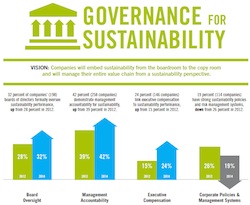According to a recent report, while there are pockets of sustainability leadership in the U.S. business community, much more needs to be done. The Ceres and Sustainalytics study found that most companies are merely taking small, incremental steps to address sustainability issues that could impact not only their bottom line, but also the economy and planet.
 “Given the acceleration of environmental and social challenges globally – floods, droughts, and workplace tragedies – most U.S. corporations are not keeping pace with the level of change,” said Mindy Lubber, president of the sustainability advocacy group, Ceres. “Those that step up to the challenge will be best positioned to thrive in the rapidly changing, resource-constrained 21st century economy.”
“Given the acceleration of environmental and social challenges globally – floods, droughts, and workplace tragedies – most U.S. corporations are not keeping pace with the level of change,” said Mindy Lubber, president of the sustainability advocacy group, Ceres. “Those that step up to the challenge will be best positioned to thrive in the rapidly changing, resource-constrained 21st century economy.”
The report assesses the sustainability performance of 613 of the largest publicly traded companies in the U.S. and covers nearly 80 percent of the total market capitalization of all public companies in the country. It tracks corporate performance against 20 key metrics essential for any sustainable corporation to follow, including governance, disclosure, greenhouse gas emissions reductions and labor standards. It identifies sustainability trends across eight key sectors, highlighting industry best practices and which companies are leading among their peers. It also provides aggregate data and online scorecards for companies on each performance area. Key findings include:
- While many companies are taking action to reduce GHG emissions, few have set time-bound targets. More than two-thirds of the companies evaluated (438) have activities in place aimed at reducing GHG emissions, but only 35 percent (212) have established time-bound targets for reducing GHG emissions. In terms of renewable energy, 37 percent of companies have implemented a program, while only six percent have quantitative targets to increase renewable energy sourcing.
- More companies are setting clear sustainability standards for suppliers. Fifty-eight percent of companies (353) have supplier codes of conduct that address human rights in supply chains, compared to 43 percent in 2012. However, only a third (205 companies) have some activities in place to engage suppliers on sustainability performance issues, up from 27 percent in 2012.
- A growing number of companies are incorporating sustainability performance into executive compensation packages. Twenty-four percent of companies (147) link executive compensation to sustainability performance – up from 15 percent in 2012.
The metrics used in this report were first spelled out in the Ceres Roadmap for Sustainability, which has been used by dozens of leading companies since 2010 to incorporate sustainability into their business planning and corporate accountability infrastructure.
“The findings of this report should inspire companies to examine their own progress and identify where they stand on the path to sustainability,” said Michael Jantzi, CEO and Founder of Sustainalytics. “This is about more than how companies stack up against their peers – it’s about how innovation is driving performance from the corporate boardroom throughout the entire supply chain.”

